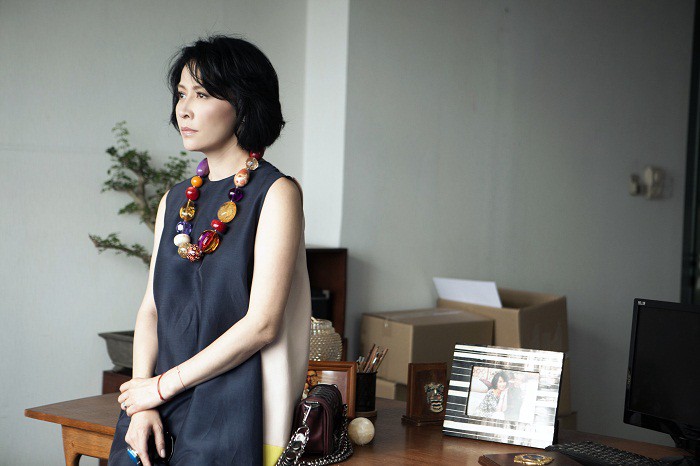The title of Flora Lau’s debut feature film, Bends, refers to the winding river that separates Hong Kong from the Chinese mainland. The theme of
the film is separation — the wealthy from the poor, the employer from the employed, traditional Chinese culture from the more modern values of Hong Kong,
husbands from wives — and the film exists in the quiet moments when boundaries are breached.
Writer/director Lau has constructed a sophisticated, subtle drama that examines some big questions through the minutiae of every day lives and challenges.
The film is beautifully shot by Christopher Doyle (In the Mood for Love) and the strong sense of place, the Hong Kong/Shenzhen border, provides an
engaging, evocative backdrop for the explorations of the social contradictions at play.
Women and Hollywood: In a few of your own words, please describe your film.
Flora Lau: Bends is a film about economical, political and physical borders. It’s about two people who are from very different social backgrounds
who have to interact with each other, forming and interesting friendship.
WaH: Can you talk a little about the theme of separation and your study of the quiet moments when the separated entities come together?
FL: When I first set out with this film project I wanted to capture Hong Kong and its current situation. Hong Kong is a city that changes so quickly and I
feel that if I don’t capture it now, it will have changed again in five years. I grew up when Hong Kong was still a British colony and now it’s under
Chinese administration. Our relationship with China has changed so much. When I talk about the river separating the two worlds, it’s interesting to me
because it’s such a small river — you can almost walk across — but it created two different cultures and people with totally different lives, even though
we share the same ancestors. I wanted to write about the new relationship we’re forming now and show a different perspective. The two sides have different
perspectives, but ultimately we’re connected on a very human level. Those quiet moments are when they see what it is that we share, what it is that is
human.
WaH: You studied film and you’ve made two short films that went through the festival circuit. Please can you tell us about your journey and the challenges
of making your first feature film?
FL: I’ve done short films and documentaries before, and I think this experience is completely different. Even just the writing part of it is different —
this took me two years and just the idea of being alone and developing the script is interesting. On this project I was able to work with an amazing crew
and cast. Putting my thinking and ideas into action was an amazing experience. Of course there are challenges — every part of the filmmaking was a
challenge, from writing to pre-production, raising the money and, on set, I had to learn to find the balance between being flexible and being very stubborn
and when I would not compromise.
WaH: You had to pick you battles. Were you away of any issues arising as a consequence of being a female director?
FL: In general people were very open about it. But there are some difficulties because there aren’t enough female directors and so the crew might not have
experience with a female director, it’s new to them. I don’t understand why there aren’t more women directors.
WaH: Many of the women here at the LFF are first time directors too, and it’s very difficult to get a feature film funded when you’re a first time
director. And often as hard to get your second funded. Have you started thinking about your second feature?
FL: Yes — I’m going to write my second feature.
WaH: Do you have any particular advice for women film directors?
FL: Female or first time, it’s important to be brave. It can be difficult to have you own voice, but that is the most important thing about your film. It
can also be a hindrance — it can stop you if you start to doubt yourself and question how much you want to show.
WaH: Was film school an important stage for you in terms of finding your voice as a filmmaker?
FL: Film school is a place to meet like-minded people who are in the same stage in terms of their filmmaking. The London Film School was really important
for me. We were from all over the world — Mexico, Hungary, South Africa — different people with different perspectives. Of course the technical side is
important as well.
WaH: Are there any women filmmaking that have influenced your work or that you particularly admire?
FL: Agnes Varda, Naomi Kawase, Lynne Ramsay.
WaH: Are there any misconceptions about you as a woman director?
FL: Maybe because I’ve lived in different places — I learned filmmaking here in London — and so one misconception is the questioning of my identity. I
like that my identity comes from different backgrounds and different perspectives. I think that is a strength for a filmmaker.







